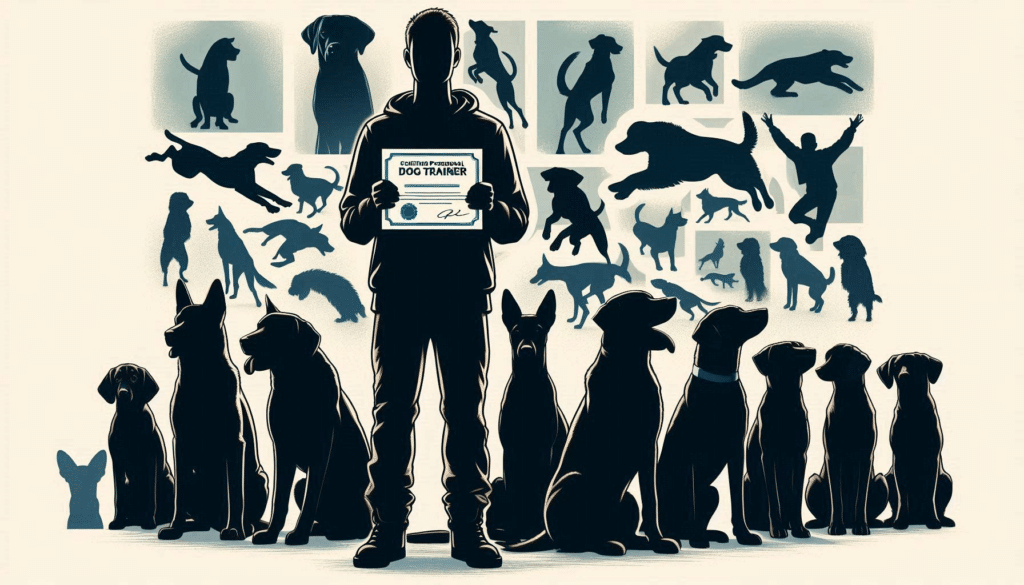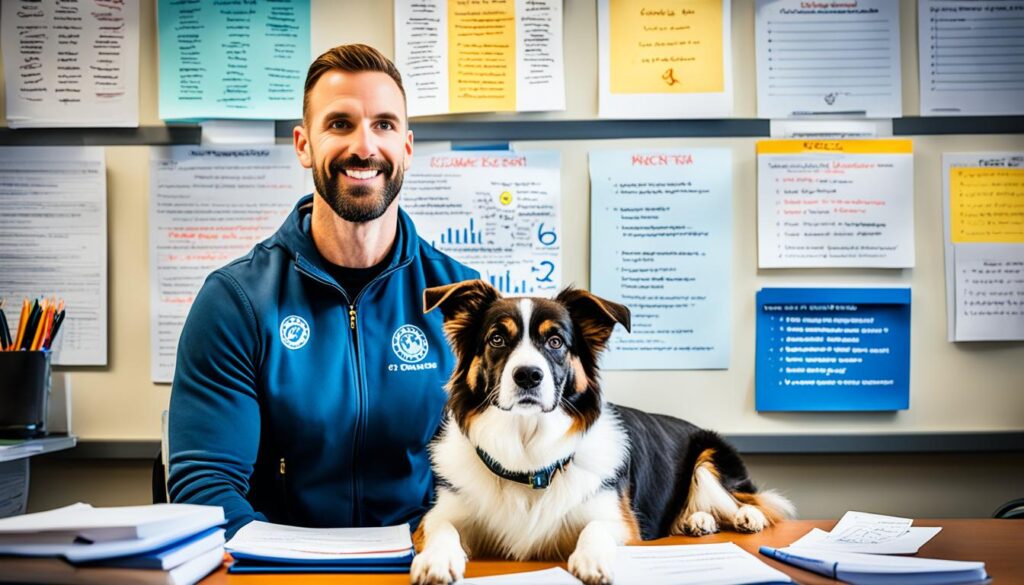For those passionate about canines and a dream of a fulfilling profession, the opportunity to become a certified dog trainer beckons. Aspiring trainers across the United States can transform their love for dogs into a dynamic dog training career, empowering owners and their pets with the tools for a harmonious life together. A dog trainer certification is a decisive step towards building a bond of trust and respect between humans and dogs, shaping a path that is as rewarding as it is transformative.

Key Takeaways
- Becoming a certified dog trainer can lead to a diverse and satisfying career path.
- Dog trainer certification is a stepping stone to developing effective training techniques.
- A professional dog training career can significantly impact animal and human lives.
- Embarking on this journey equips one with the knowledge to foster better communication between dogs and their owners.
- Certification endorses a trainer’s commitment to ethical and humane animal training practices.
- Continuous dog behavior and training education keep trainers at the forefront of the industry.
- With certification, trainers can explore various specializations within dog training.
Starting Your Journey: How to Become a Dog Trainer
Embarking on the journey to become a dog trainer involves more than just a love for canines; it necessitates a foundational understanding of dog behavior and a commitment to learning the art and science behind practical training. Pursuing this career path can be deeply rewarding, as it enhances the relationship between dogs and their owners through education and behavior modification.
Becoming a Dog Trainer: Understanding the Basics of Dog Training
For those wondering how to become a dog trainer, it begins with mastering the basics of dog training. This includes familiarizing oneself with diverse canine personalities, grasping the principles of positive reinforcement, and appreciating the importance of patience and consistency. Prospective trainers learn to observe, interpret, and shape dog behavior, developing the skills to effectively guide dogs through the learning process.
Certification Council for Professional Dog Trainers (CCPDT): The First Step
Achieving CCPDT certification represents a significant milestone in a dog trainer’s career. As an authoritative body, the CCPDT sets the standard for knowledge and competence in the industry, ensuring that certified trainers are well-equipped to address various behavioral challenges. The certification proves a trainer’s dedication to ethical practices and ongoing investment in professional development.
Training Classes: Choosing the Right Dog Training Program
Selecting the proper dog training program is a critical step in a future trainer’s education. Prospective trainers must evaluate the program’s curriculum, seeking one that thoroughly covers dog training basics. Hands-on experience is invaluable, so programs that offer practical training modules are highly advantageous. It is also essential to assess the qualifications and expertise of the instructors, as these mentors will shape the development of the trainers-in-training. Well-chosen training programs empower aspirants with the knowledge and experience necessary to embark on a successful career in dog training.
The Path to Professional Certification: Dog Trainer Certification Explained
Pursuing professional certification such as the CPDT-KA certification is a foundational step for those passionate about canine behavior and training. This certification attests to the trainer’s expertise and dedication to best practices and sets a benchmark for educating dog owners and fostering positive trainer-client relationships. Demystifying the certification process not only aids aspiring trainers in navigating their paths but also assures clients of the quality and reliability of services offered.

Certified Professional Dog Trainer-Knowledge Assessed (CPDT-KA): What It’s All About
The CPDT-KA certification is a rigorous, standardized process to measure a dog trainer’s theoretical knowledge and practical skills. This credential underscores a professional’s proficiency in training and behavior modification strategies, adherence to ethical standards, and a commitment to lifelong learning in dog training. This certification is a hallmark of excellence within the dog training community.
Association of Professional Dog Trainers: Networking and Resources
Becoming an Association of Professional Dog Trainers (APDT) member offers indispensable benefits, including a platform for networking and a reservoir of professional resources. The APDT fosters an environment where members can exchange ideas, participate in educational workshops, and access a wealth of data-driven research to enhance their practice—empowering trainers to advance their careers and contribute to the collective knowledge base of the field.
Continuing Education: Staying Updated in Dog Training Techniques
Continuing education for dog trainers is crucial in a landscape where dog training techniques and understanding of animal behavior consistently evolve. Trainers must prioritize staying current with breakthroughs in science-based training methodologies and industry best practices. Ongoing education ensures that trainers can provide the most effective, ethical, and welfare-centric services to clients and their canine companions—elevating the standards of dog training as a profession.
Expanding Your Skills: Becoming a Certified Dog Trainer
For those on the journey of becoming a certified dog trainer, enhancing abilities by learning advanced training techniques and understanding canine behavior is invaluable. Training programs offered by institutions such as the Karen Pryor Academy notably contribute to this growth, helping trainers add depth and breadth to their expertise.

Karen Pryor Academy: Specializing in Positive Reinforcement Techniques
The Karen Pryor Academy stands at the forefront of modern dog training methodologies, emphasizing positive reinforcement techniques. Adopting these methods improves dog behavior and fosters a positive relationship between the dog and its handler. Graduates of the academy are skilled in applying these techniques, which are considered effective and humane.
Service Dog Training: A Specialized Certification Program
Acquiring a service dog training certification opens the gateway to a specialized niche within dog training. This certification equips trainers with the knowledge and skills required to prepare dogs for assisting individuals with disabilities. With a demand for high-quality service dogs, certified trainers play a crucial role in transforming canines into indispensable companions for those in need.
Animal Behavior: Understanding Dog Psychology and Training Needs
A deep understanding of dog behavior is essential for customizing training approaches to fit each dog’s unique needs. Recognizing the significance of dog psychology, trainers can interpret cues and behavioral patterns, allowing them to devise training strategies that are both effective and considerate of the dog’s mental well-being.
Beyond Dogs: Applying Training Techniques to Other Animals
Delving into animal training, the expertise acquired in dog training lays a groundwork that extends beyond canines. Dog trainers often discover that their principles can be adapted to various animal species, highlighting core training techniques’ versatility and universal applicability.
Cat Training: Is it Possible to Train Your Feline Friend?
While cats are known for their independent nature, cat training is indeed possible and can strengthen the bond between pets and their humans. It requires patience and understanding the distinct motivators for feline behavior, but the payoff is a more harmonious household.
Humane Training Techniques: Universal Principles of Animal Training
When applying training techniques to other animals, humane methods such as positive reinforcement are kinder and often produce superior results. These universal principles of animal training are adaptable and can be customized to the needs of different species.
Working with Dogs vs. Other Animals: A Comparative Approach
Training dogs may seem vastly different from working with other animal species, but at the core, understanding and communication are critical elements of practical training across the board. Below is a comparison that showcases how adaptations in approach can lead to success with various animals.
| Species | Training Focus | Method Adaptations | Behavioral Consideration |
| Dogs | Obedience and Socialization | Command-based, high social reinforcement | Pack dynamics, Pleasure in pleasing |
| Cats | Litter Training and Tricks | Clicker training, tangible rewards | Preference for independence, Less social |
| Birds | Vocal Mimicry, Free Flight | Repetition, consistency, gentle handling | High intelligence, Need for mental stimulation |
Making a Difference: Using Your Certification for Good
After certification, dog trainers possess a powerful tool for effecting positive change. They can use their certification for good to engage in service and therapy dog training, offering profound contributions to individuals and communities. Trainers who dedicate their expertise to these fields foster well-being in humans and canines alike and reinforce the value of humane training methodologies within the dog training community.
Professional Dog Trainer: Opportunities in Service and Therapy Dog Training
As professional dog trainers, individuals have the unique chance to specialize in service and therapy dog training. This specialized training empowers dogs to assist people with disabilities or provide emotional support, enriching lives through their companionship. Service and therapy dog training is not just a job—it’s a fulfilling way to use your certification for good, making a tangible difference in society.
Association of Dog: Advocating for Humane Dog Training Practices
Advocating for humane dog training is vital to advancing the industry and ensuring the well-being of dogs. Coaches can help set industry standards that prioritize the dogs’ physical and emotional health by aligning with associations that emphasize gentle, evidence-based training methods. This advocacy safeguards against harmful practices and guides the dog training community toward more ethical, effective strategies.
Training Professionals: Contributing to the Dog Training Community
Contributing to the dog training community is another powerful outlet for certified trainers. Beyond the direct impact on canine lives, trainers who share their insights and continue their education inspire peers and evolve the industry. By mentoring up-and-coming trainers or participating in community events, trainers create a ripple effect of knowledge and passion for the craft.
| Contribution Area | Brief Description | Community Impact |
| Service Dog Training | Training dogs to assist individuals dealing with physical disabilities. | Increase in accessible support aids for people with disabilities. |
| Therapy Dog Training | Preparing dogs to provide comfort and support in therapeutic settings. | Enhanced mental well-being for people experiencing emotional challenges. |
| Humane Training Advocacy | Promoting non-coercive, rewards-based training methods. | Shift towards more ethical training practices that respect canine welfare. |
| Community Involvement | Sharing expertise at workshops, conferences, and mentor programs. | Strengthened network of informed and educated dog training professionals. |
From Certification to Career: Becoming a Professional Dog Trainer in the U.S.
The journey from obtaining your certification to becoming a professional dog trainer is filled with continuous learning and practical experiences. In the dynamic field of dog training within the U.S., you must align your career objectives with your passions and professional goals.
Training School: How to Choose the Best Dog Trainer Program in the U.S.
Selecting the right program is the first critical step in your career. Consider programs that offer comprehensive coverage of canine behavior, training methodologies, and hands-on opportunities. Here’s a display of considerations you might ponder:
| Program Feature | Why It’s Important | Questions to Ask |
| Accreditation | Ensures the program meets professional standards | Is the program recognized by relevant authorities? |
| Curriculum | Prepares you with a robust set of skills | Does the program offer a diverse range of subjects? |
| Hands-on Experience | Provides practical dog training experience | How much real-world training does the program include? |
| Instructor Expertise | Learning from experienced professionals | What are the qualifications of the trainers/mentors? |
| Post-grad Support | Helps in building a career in dog training after completion | Does the program offer job placement assistance or business advice? |
Work with Dogs: Building a Rewarding Career in Dog Training
Once you’ve chosen a program that sets you on the right path to becoming a professional dog trainer, it’s time to focus on building a rewarding career. This involves understanding different dogs’ unique personalities and needs, cultivating a deep-seated passion for animal behavior, and learning how to communicate effectively with pets and their owners.
- Establish a niche based on your training expertise and preferences.
- Develop strong business skills to manage your dog training venture or navigate the industry.
- Engage in continuous learning and professional development.
Professional Certification: Making Your Mark as a Dog Training Professional
Attaining your professional certification for dog trainers is more than a formality; it’s a milestone that showcases your dedication to high standards and ethical practices in dog training. It speaks volumes to prospective clients and sets you apart in a competitive market.
- Research certification bodies and understand the requirements.
- Prepare for and complete any necessary examinations.
- Commit to ongoing education to maintain and upgrade your certification.
Remember, choosing a dog trainer program in the U.S. that aligns with your career goals is crucial to your success. Combine this with a steady build-up of experience and the credibility that professional certification provides, and you’re well on your way to a fulfilling and prosperous career in dog training.
Conclusion
Embarking on the path to a dog trainer career is not simply a profession—it’s a calling that synchronizes passion with purpose. This journey to become a certified dog trainer encapsulates an array of experiences, from the rigors of obtaining the proper credentials to the immense satisfaction of enhancing human-canine relationships. What emerges at the career’s conclusion is a montage of dedication, enriched knowledge, and a myriad of hands-on encounters that shape a formidable job.
The summary of becoming a certified dog trainer is defined by continuous progress—not only in one’s skill set but also in the ongoing commitment to learning and adapting to new methods and practices within the industry. The agora of professional dog training is underpinned by certifications that solidify one’s expertise and open doors to various specializations, including service dog training or even venturing into the behaviors of other animal species.
Today’s narrative ends with the premise that the certification is but the starting line of a rewarding pursuit in the American dog training landscape. A vocation that boldly promises growth, community impact, and the joy of working with animals awaits. Let this conclusion not be the end but an invitation for aspiring professionals to delve into the vibrant realm of dog training and join the ranks of those who mold the future, one command, one click, one dog at a time.
Q: What are the initial steps to becoming certified as a professional dog trainer?
A: To become a certified professional dog trainer, one should start by gaining a solid dog training and behavior foundation. This often involves getting hands-on experience with dogs, which can be achieved by volunteering at local dog shelters or working under the guidance of professional trainers. Additionally, studying the science-based methods of dog training and behavior modification is essential, and considering taking courses or attending workshops provided by reputable institutions such as the Association of Animal Behavior Professionals or the Academy for Dog Trainers.
Q: How can people train to be certified professional dog trainers?
A: People interested in earning the title of certified professional dog trainer should pursue formal education and certification through recognized organizations. Key steps include completing an educational program covering essential dog behavior knowledge, training theory, teaching skills, and ethics. Afterward, gaining practical, hands-on experience by training dogs in various settings is crucial. One must pass an examination administered by a credible entity like the Certification Council for Professional Dog Trainers (CCPDT) or the International Association of Animal Behavior Consultants (IAABC) to certify.
Q: Are there specific certifications for those looking to specialize in certain types of dog training, such as police dog training?
A: Yes, there are specialized certifications for trainers who wish to focus on specific types of training, including police dog training, service dog training, and more. These certifications often require additional, specialized training and instruction skills in the chosen area. Organizations like the National Association of Dog Obedience Instructors (NADOI) and other specialized agencies provide these certifications. For police dog training, for instance, trainers may need to complete programs intensely focused on law enforcement techniques and canine legal knowledge.
Q: What role does the Association of Dog Obedience Instructors play in becoming a certified dog trainer?
A: The Association of Dog Obedience Instructors (ADOI) plays a significant role in the dog training profession by offering certifications, resources, and educational opportunities for dog trainers. Being a part of ADOI helps trainers meet high standards in dog training and instruction skills. The association also promotes ongoing education, offering workshops, seminars, and conferences to ensure that trainers stay updated on the latest dog training methodologies. Trainers certified through ADOI are recognized for their commitment to responsible dog ownership and scientifically informed training practices.
Q: How important is hands-on experience for aspiring dog trainers?
A: Hands-on experience is crucial for aspiring dog trainers. While theoretical knowledge provides a solid foundation, the skills and understanding acquired through practical experience are invaluable. Working directly with dogs and their owners allows trainers to apply their knowledge in real-world situations, develop problem-solving skills, and learn to adapt to various behaviors and scenarios. Gaining experience through internships, volunteering at animal shelters, or working with a mentor can significantly enhance a trainer’s ability to train dogs and support their owners effectively.
Q: Can dog owners become certified trainers, and how would it benefit them?
A: Dog owners can become certified trainers, offering numerous benefits. First, it deepens their understanding of their dog’s behavior and needs, allowing for more effective communication and a stronger bond. Additionally, it equips dog owners with the skills to manage behavioral issues more proficiently and promotes responsible dog ownership strategies across their community. Obtaining a certification also allows dog owners to turn their passion into a profession, helping other dogs and owners achieve harmony and desired behaviors.
Q: What is the importance of choosing a certification program focusing on science-based dog training?
A: Choosing a certification program focusing on science-based dog training is critical because it ensures that the training methods taught are ethical, practical, and rooted in the latest animal behavior research. Science-based training emphasizes positive reinforcement and understanding the underlying causes of behavior rather than using punishment. This approach promotes the well-being of the dog and strengthens the dog-owner relationship. Programs that adhere to science-based methodologies prepare trainers to implement the most humane and effective training techniques.
Q: How can one contact the Certification Council for Professional Dog Trainers?
A: To contact the Certification Council for Professional Dog Trainers (CCPDT), individuals interested in becoming certified trainers or those seeking more information should visit the CCPDT’s official website. The website provides resources on certification processes, requirements, and study materials. Additionally, it offers contact information, including email addresses and phone numbers, for direct inquiries. Engaging with the CCPDT is crucial for anyone looking to achieve professional certification and advance in the dog training profession.

